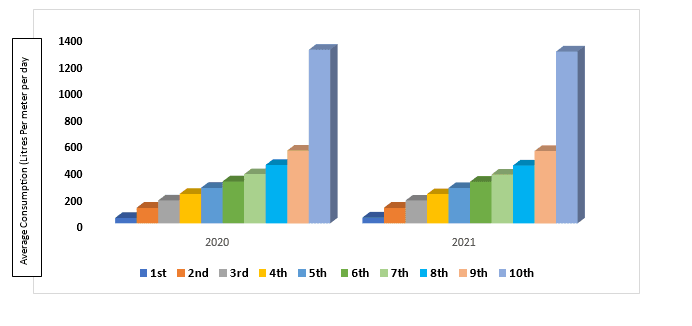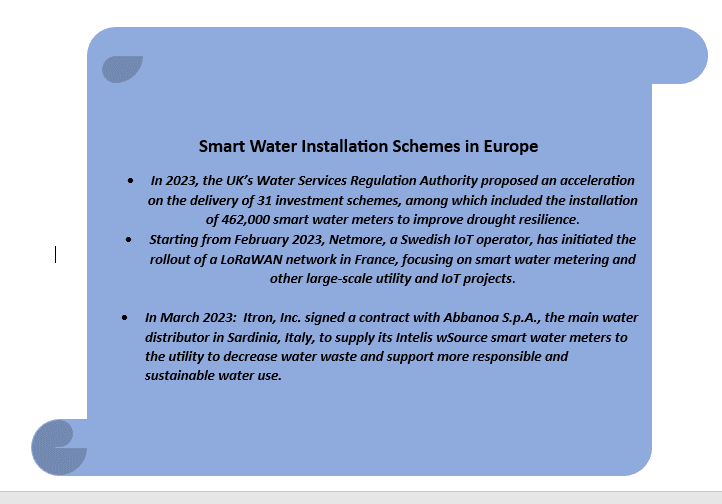- Home
- About Us
- Industry
- Services
- Reading
- Contact Us
Residential Smart Water Meter Market has Seen Soaring 23.9% Growth to Reach USD 890 Million by 2030, Projects Univdatos Market Insights `
Author: Vikas Kumar
November 17, 2023
According to a new report by Univdatos Market Insights, the Residential Smart Water Meter Market is expected to reach USD 890 Million in 2030 by growing at a CAGR of 23.9%. The residential smart water meter market is growing at a significant rate owing the factors such as smart water meters help households to conserve water by providing real-time usage data, enabling them to identify and address leaks or other issues. This can lead to significant water savings, particularly in regions where water is scarce or expensive.
Access sample report (including graphs, charts, and figures): https://univdatos.com/get-a-free-sample-form-php/?product_id=47993
Further, smart water meters can improve billing accuracy by automatically reading water usage data and transmitting it to the utility company. This can help to reduce errors and disputes and can also enable more accurate billing based on actual usage.
Moreover, the increasing installation of residential smart water meters in developing economies is further accelerating its market demand. For instance: In 2021, U.S. electric utilities had about 111 million advanced (smart) metering infrastructure (AMI) installations, equal to about 69% of total electric meter installations.
Fig1: Domestic Metered Public Water Consumption by Decile, 2020 & 2021

Various countries are rolling out smart water meter schemes by collaborating with government and private companies that are positively escalating the demand for the residential smart water meter market.
- In July 2023, Indian smart metering major Genus and an affiliate of Singapore-based GIC announced a joint venture (JV) agreement to set up a funding platform for the smart meter projects with an initial $2 billion pipeline.
- In 2022, The Tokyo Metropolitan Government installed 30,000 smart water meters in 2022 and will install 130,000 by 2024. The aim is to install them in all 7.8 million users by 2030. At the same time, a smartphone application will be developed to improve customer service.
- In Nov 2022, Singapore’s national water agency collaborated with Itron industrial IoT network canopy for smart water metering from SP Group, a utility group in the Asia Pacific, to connect some 300,000 residential and C&I smart water meters and drive water conservation goals.
Click here to view the Report Description & TOC https://univdatos.com/report/residential-smart-water-meter-market/
Rising Need To Detect And Prevent Water Leakage is Gaining Maximum Traction in the Market
The residential smart water meter market in Europe has experienced significant growth due to various factors. One of them is the increasing installation of smart water meters at households for obtaining real-time information about water consumption.
Additionally, the demand for the residential smart water meter market has been boosted by the rollout of smart water meter schemes in the region. For instance, Britain’s water regulator Ofwat has approved a 2.8 billion plan that includes seven smart water meter schemes. The installation of 462,000 smart meters by the end of 2025 aims to increase resilience to drought by reducing demand and enabling faster leak detection. Furthermore, the EU Energy Efficiency Directive seeks to enhance energy efficiency across Europe, with a focus on promoting smart water metering to detect and prevent water leaks, which can reduce energy consumption linked to water treatment and distribution.

Conclusion
In recent years, more and more households have been adopting residential smart water meters due to various driving factors. These devices allow for real-time monitoring of water usage, which helps households to identify areas where they can reduce their consumption. This not only conserves water resources but also lowers water bills. Additionally, smart water meters are equipped with remote connectivity, enabling utilities to detect leaks, thefts, and other abnormalities without physical inspection. This helps to prevent water damage and reduce repair costs. Furthermore, smart water meters can be integrated into home automation systems, allowing households to conveniently control their water usage through smartphones or other devices. This ultimately helps to reduce their environmental impact. In summary, the increasing adoption of smart water meters is largely driven by the need to conserve water resources, lower water bills, and improve water management.
Get a Callback
